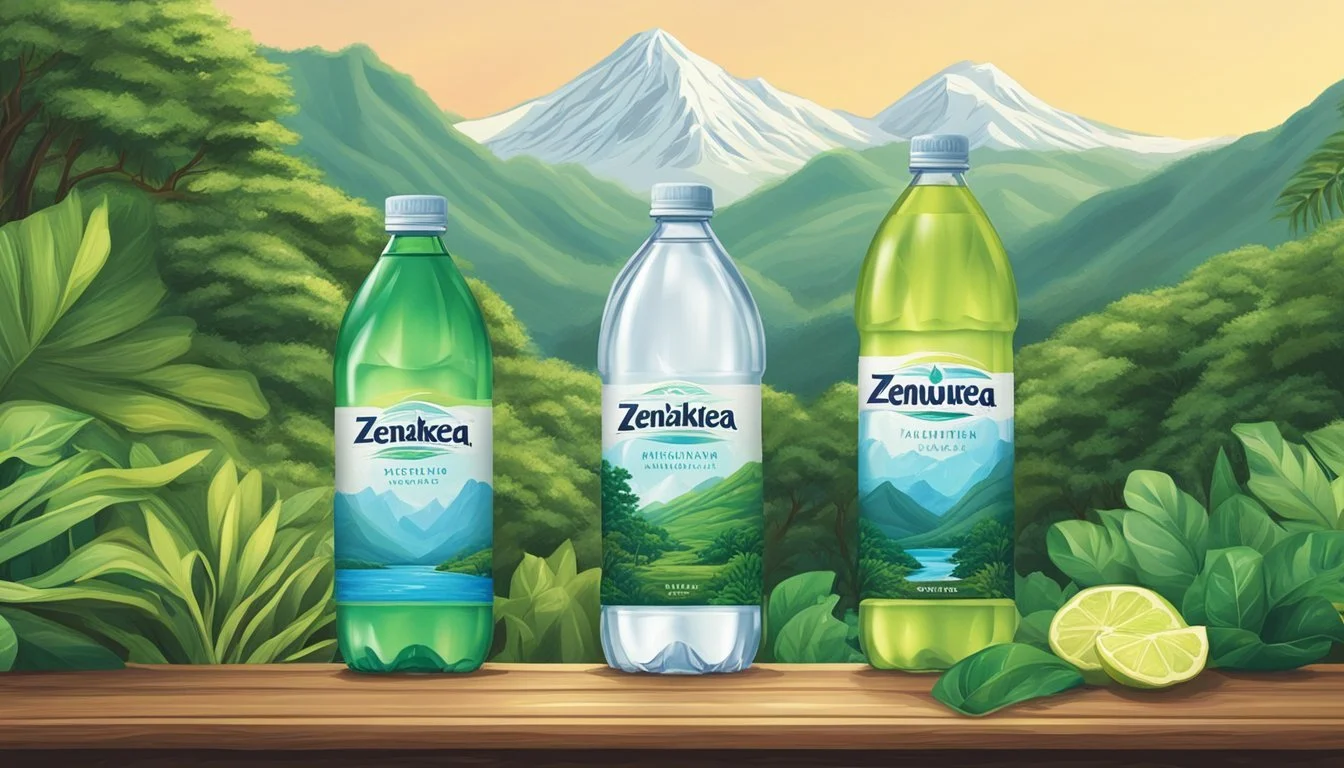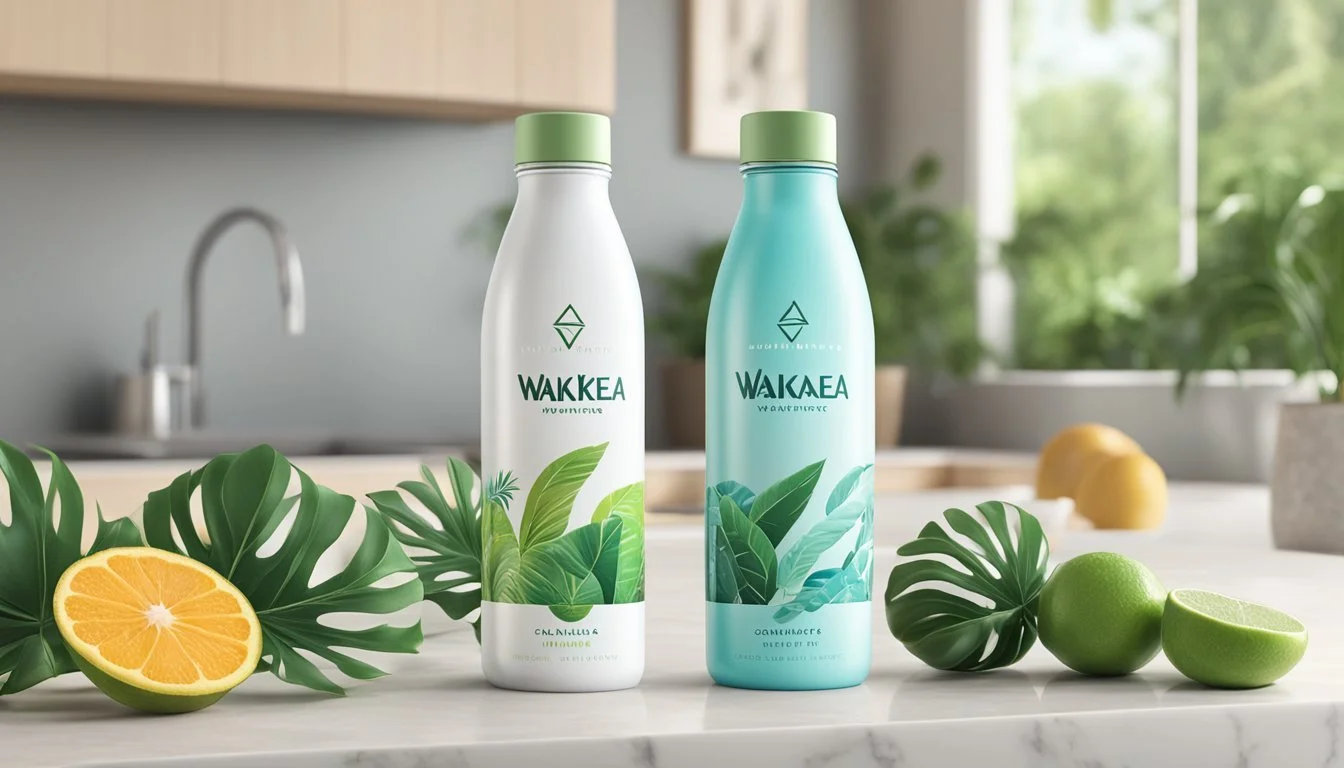Waiakea vs. Zenwtr
Comparing Top Bottled Water Choices
When it comes to bottled water, consumers are often spoilt for choice with brands like Waiakea and ZenWTR both offering unique benefits. Waiakea, sourced from the Mauna Loa volcano, boasts rich mineral content and natural alkalinity, providing both hydration and a host of health benefits. ZenWTR, on the other hand, stands out for its natural alkalinity with a pH of 9.5, giving it a smoother taste and the promise of a refreshing drink.
For those seeking a combination of sustainability and health benefits, ZenWTR might be the better option. This brand emphasizes its eco-friendly mission by using bottles made from 100% recycled ocean-bound plastic. Meanwhile, Waiakea’s volcanic filtration process enriches the water with silica, calcium, and magnesium, promising not just hydration but also a mineral boost.
Both brands offer clear advantages, but the choice ultimately hinges on individual preferences and priorities. Whether it's Waiakea's volcanic minerals or ZenWTR's commitment to sustainability, both provide high-quality hydration options to meet diverse consumer needs.
Background on Bottled Water
Bottled water, a widely popular choice, offers an alternative to tap water. Consumers often opt for it due to perceived taste differences and convenience. It comes in various types, including natural spring water, purified water, and mineral-enhanced options, each with unique characteristics.
Natural spring water is sourced from underground springs and retains natural minerals. Purified water undergoes treatment processes to remove impurities, ensuring a high level of purity. Both types cater to differing consumer preferences, favoring either natural sources or enhanced purification.
Taste plays a significant role in users' choices. Many believe bottled water tastes better than tap water, which can be influenced by the mineral content and source. Enhanced taste is often attributed to the natural minerals retained in spring water or those added to purified water.
Health benefits are another consideration. Bottled water brands often highlight the presence of essential minerals such as calcium and magnesium, which can contribute to overall well-being. Consumers seeking specific health benefits may choose brands based on these factors.
The sources of bottled water can vary widely. Some companies use municipal water as a base, subjecting it to further purification, while others utilize untouched natural springs. The choice of source impacts both taste and quality.
In summary, bottled water provides a versatile option based on individual preferences for taste, mineral content, and source. Whether derived from natural springs or purified through advanced processes, it fulfills diverse needs in the realm of drinking water.
Understanding Alkalinity in Water
Alkaline water has been a topic of interest for many due to its potential health implications and differences in natural and artificial sources. This section will break down the key points of pH levels and the distinction between natural and artificially made alkaline water.
pH Level and Health Implications
The pH level of water indicates its acidity or alkalinity. A pH level above 7 is considered alkaline. ZenWTR typically has a pH of 9.5, while Waiakea Water has a pH of 8.8.
High pH levels in alkaline water are believed to neutralize excess acid in the body. Some consumers choose alkaline water for its potential health benefits, such as improved hydration and better pH balance in the body.
Additionally, there are studies that suggest alkaline water can help neutralize stomach acid and potentially improve certain health conditions. It is essential to note that while some health benefits are reported, more scientific evidence is needed to confirm these claims conclusively.
Natural vs. Artificial Alkaline Water
Natural alkaline water derives its alkalinity from naturally occurring minerals. Waiakea Water is a good example with its source being volcanic rock filtration, contributing to a pH level of 8.8.
On the other hand, artificial alkaline water achieves its pH level through processes such as ionization or by adding compounds like calcium or magnesium. ZenWTR claims to achieve its 9.5 pH through a meticulous purification process that includes reverse osmosis and vapor distillation.
Natural alkaline water is often favored for its mineral content, which contributes to both its taste and health benefits. Artificially alkaline water allows for controlled pH levels but may rely on synthetic means to achieve the same alkaline state.
Understanding the source and method of achieving alkalinity can help consumers make an informed choice based on their preferences and potential health benefits.
Comparing Waiakea and Zenwtr
Both Waiakea and Zenwtr tout distinctive characteristics, from their sources and purification processes to their mineral compositions and potential health benefits.
Source and Origin
Waiakea originates from Hawaii, specifically from the Mauna Loa volcano. Its source is famed for its purity and natural filtration through volcanic rock, providing naturally alkaline water with an impressive pH level of 8.8.
Zenwtr sources its water from various locations but focuses on ocean-bound plastic recycling. This unique approach not only aims to provide clean water but also addresses environmental concerns by reducing ocean plastic waste. Their dedication to eco-friendly practices sets them apart in the bottled water market.
Purification and Filtration Processes
Waiakea benefits from natural filtration through volcanic rock, which enhances its mineral content and gives it a high alkaline pH. After collection, Waiakea is minimally processed to maintain its natural properties, emphasizing its naturally high purity and mineral-rich composition.
Zenwtr uses a multi-step purification process including reverse osmosis and other advanced filtration techniques. This ensures that the water is not only clean but also free from contaminants. The focus on rigorous purification guarantees high-quality water for consumers who prioritize purity and cleanliness.
Mineral Composition and Health Benefits
Waiakea boasts a rich mineral composition that includes magnesium, calcium, potassium, and silica. The naturally occurring minerals in Waiakea are believed to offer various health benefits such as improved hydration, better bone health, and potential anti-inflammatory properties due to its high silica content.
Zenwtr, being purified through reverse osmosis, may have a different mineral profile. This process often removes a significant portion of natural minerals, which are then sometimes reintroduced. Despite this, Zenwtr promotes itself based on the health benefits of hydration and its commitment to environmental sustainability by using recycled ocean-bound plastic for its bottles.
In essence, while both Waiakea and Zenwtr offer unique benefits, their differences in source, purification methods, and mineral content provide varied choices for consumers. Whether prioritizing natural filtration and mineral content or advanced purification and environmental impact, each brand presents strong points for those seeking quality bottled water.
Taste and Hydration
When comparing Waiakea and ZenWTR, taste and hydration are key factors.
Taste Profile:
Waiakea: Offers a clean, crisp taste derived from its volcanic rock filtration. It's slightly sweet, making it a pleasant option for everyday consumption.
ZenWTR: Known for its smooth taste, it benefits from natural alkalinity with a pH of 9.5, which some find more refreshing and less metallic.
Hydration: Both brands aim to provide excellent hydration, but there are nuances to consider.
Electrolytes and Minerals:
Waiakea: Contains natural electrolytes such as magnesium, calcium, and silica, contributing to effective hydration and a balanced taste.
ZenWTR: Also features natural electrolytes. The higher pH level is believed to offer superior hydration for some, due to the enhanced alkaline content.
Experience: Drinkers of Waiakea often appreciate the slightly sweet and mineral-rich water which feels light on the palate. On the other hand, ZenWTR's smoother, alkaline-heavy profile is favored by those who prefer a softer drink.
In summary, Waiakea offers a sweeter taste with volcanic minerals, while ZenWTR's higher pH delivers a smoother hydration experience.
Environmental Sustainability and Ethics
Waiakea and ZenWTR are two bottled water brands that emphasize environmental sustainability and ethical practices. This section explores their sustainable sourcing practices and the environmental impact of their packaging.
Sustainable Sourcing Practices
Waiakea sources its water from a renewable and sustainable aquifer in Hawaii. This aquifer boasts a recharge rate of 1.4 billion gallons per day. Additionally, Waiakea uses 33% renewable energy in its bottling facility, showcasing their commitment to reducing their carbon footprint.
ZenWTR focuses on utilizing natural alkalinity and sources its water with care to maintain environmental balance. Their operations aim to minimize disruption to the ecosystem. Both brands are dedicated to preserving natural resources while providing high-quality bottled water.
Packaging and Environmental Footprint
Waiakea employs eco-friendly packaging by using 100% recycled materials for their bottles. This reduces waste and encourages the use of reusable bottles. They also strive to minimize their environmental impact through various initiatives.
ZenWTR leads the industry with their 100% ocean-bound plastic bottles. This innovative approach not only recycles plastic but also prevents marine pollution. Additionally, they allocate 1% of sales to cleaning up the oceans.
Both brands prioritize reducing their environmental footprint and encouraging sustainable consumer practices through their packaging efforts.
Health and Safety Standards
Both Waiakea and ZenWTR adhere to stringent health and safety standards ensuring top-quality bottled water. These standards encompass water quality, contaminant levels, and certifications that verify their safety for consumption.
Water Quality and Contaminants
Waiakea boasts a naturally alkaline pH of 8.8, which can help neutralize body acidity. The water is sourced from Hawaiian volcanic rock and undergoes natural filtration, reducing the need for artificial treatments.
ZenWTR, with a pH of 9.5, is also naturally alkaline, providing similar benefits. It is notable for its minimal contaminant levels. Both brands ensure low levels of chlorine and fluoride, adhering to safe drinking water standards. Regular testing guarantees these levels remain within healthful limits.
Health and Safety Certifications
Waiakea holds several certifications, including CarbonNeutral®, ensuring its environmental impact is minimized. NSF International certifies its compliance with strict health and safety guidelines.
ZenWTR is similarly certified by reputable organizations. It has the Plastic Bank® certification for reducing ocean-bound plastic and is also third-party tested for purity and safety. These certifications reflect their commitment to health benefits and safe drinking water standards, reinforcing consumer trust.
Market Position and Consumer Choices
Examining the market placements and consumer preferences for Waiakea and Zenwtr highlights critical differences in price and brand reputation. These factors significantly impact consumer decisions when choosing a suitable bottled water brand.
Price Comparison
When comparing Waiakea and Zenwtr, it's essential to consider the price points as a determining factor for many consumers. Waiakea is generally positioned in the premium segment, with prices reflecting its volcanic filtration process and alkaline pH. A typical 500 ml bottle can range from $2 to $3 depending on the retailer.
In contrast, Zenwtr also falls into the premium category, but slightly edges towards higher sustainability features that can affect pricing. Zenwtr’s 500 ml bottle commonly retails for around $2.50 to $3.50, driven by its commitment to using recycled ocean plastic for packaging.
Ultimately, the choice may boil down to what consumers prioritize more—unique filtration and source with Waiakea, or environmental consciousness with Zenwtr.
Brand Reputation and Reviews
Brand reputation and customer reviews play pivotal roles in shaping consumer preferences. Waiakea enjoys a robust reputation for its Hawaiian origins, marketed as both pure and naturally alkaline. Reviewers often praise its crisp taste and health benefits, which align with the brand's positioning in the high-end market.
Zenwtr, on the other hand, leverages its sustainability angle, promoting itself as the first bottled water made from 100% recycled ocean-bound plastic. Consumers appreciate this eco-friendly approach, noting the brand’s environmental impact in reviews.
While both brands earn high marks for quality, Waiakea is often cited for its unique volcanic source and taste while Zenwtr garners positive attention for its green initiatives and modern branding.
Accessibility and Convenience
Waiakea and ZenWTR offer different levels of accessibility and convenience for consumers.
Grocery Stores:
Waiakea is available in many major grocery chains across the United States, making it easy for consumers to purchase during regular shopping trips.
ZenWTR is also stocked in numerous grocery stores, although its premium positioning can sometimes limit its presence to higher-end or health-focused retailers.
Convenience Stores:
Consumers can often find Waiakea in convenience stores and small local shops, aligning with its aim to reach a broad audience.
ZenWTR may be less commonly found in everyday convenience stores due to its price point but is typically available in specialized health stores.
Online Availability:
Both brands have a robust online presence. Waiakea offers direct shipping from its website and partnerships with large e-commerce platforms.
ZenWTR also provides easy access online, often through its website and various e-commerce sites, catering to consumers who prefer shopping from home.
Price Range:
Waiakea is moderately priced, which contributes to its widespread availability in various retail outlets.
ZenWTR, on the other hand, is positioned as a premium product, which reflects in its higher price, influencing its availability primarily in upscale locations.
These elements highlight the differing strategies both brands use to ensure their products are accessible and convenient for their target consumers.
More About Waiakea
Icelandic Glacial vs Waiakea: Which Bottled Water is Better?
Mountain Valley Spring Water vs Waiakea: Which Bottled Water is Better?
Waiakea vs Kirkland Signature: Which Bottled Water is Better?
Waiakea vs Richard's Rainwater: Which Bottled Water is Better?
Waiakea vs Whole Foods Italian Still Mineral water: Which Bottled Water is Better?









